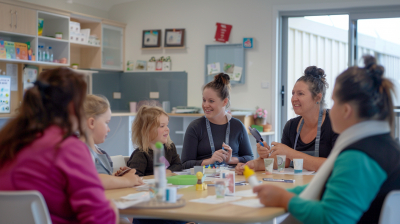News
Why not have a browse through the latest news from our FFC offices around the country and find out what has been going on at FFC in your area.
Welcoming a foster child into your home is a journey filled with unique challenges and profound rewards. Have you ever wondered what it takes to make this transition as smooth as possible for both the child and the family? This guide is designed to shed light on the essential strategies that foster parents can employ to help their new family members feel secure, valued, and understood. From establishing a sense of security to supporting emotional and psychological health, we'll explore practical tips that are crucial for nurturing a positive fostering experience.
Each child comes with their own story, needs, and hopes. How can foster parents effectively communicate and connect with them to foster a sense of belonging? Our discussion will focus on creating a welcoming environment and the importance of involving children in decisions that affect their lives. By the end of this guide, you'll learn more about the pivotal role foster parents play in shaping the journey of these young lives towards a brighter future.
1. Establishing a Sense of Security
Creating a sense of security for a foster child begins the moment they step into their new home. It's crucial to create a welcoming environment that immediately communicates safety and warmth. This can be achieved through small gestures like showing them their room, where their belongings will go, and introducing them to other household members in a calm and friendly manner. The physical environment should feel inviting, with personal space clearly designated for the child to help reduce anxiety and provide a sense of ownership and privacy.
Consistency is another cornerstone of security. Establishing predictable routines helps foster children understand what to expect each day, which significantly reduces their stress. Regular meal times, consistent school preparation routines, and a stable bedtime schedule are examples of simple practices that foster stability. These routines not only help in reducing uncertainty but also aid in building trust between the child and foster parents, as the child begins to see their new environment as reliable.
The importance of personal space cannot be overstated. Each child needs a safe area where they can retreat when overwhelmed. This space should be respected by all family members, helping the child feel secure and valued. Personalising this space with the child can further enhance their comfort, allowing them to express themselves and feel more at home.
2. Open and Honest Communication
Open lines of communication are vital in helping foster children adjust to their new surroundings. It's important for foster parents to initiate discussions about feelings and expectations early on. Encouraging the child to express their thoughts and emotions about the fostering experience can provide insights into how they are coping and what support they might need. These discussions should be held in a supportive and non-judgmental manner to foster an open dialogue.
Using age-appropriate language is essential when explaining the changes that the child is experiencing. Simplifying complex legal or social terms helps the child understand their situation better, making the transition less intimidating. Moreover, it's important to clarify that they are not at fault for the changes occurring in their life, which is a common misconception among foster children.
Active listening plays a critical role in building trust. This involves more than just hearing the words a child says; it's about understanding the emotions behind the words. By being fully present during conversations, foster parents can better address the child's needs and fears, reinforcing the child's value within the family and building a foundation of trust.

3. Involvement in Decision Making
Empowering foster children by involving them in decisions that affect their daily lives can significantly aid their adjustment. Allowing them choices, even in small matters like choosing a meal or the colour of their bedding, helps them feel they have a say in their new world. This empowerment can boost their self-esteem and sense of control, which is often lost during the transition into foster care.
It is also beneficial to involve children in discussions about household rules and to let them participate in setting these rules. This not only makes the rules feel fairer but also teaches responsibility and cooperation. For example, discussing bedtime routines and agreeing on time can help children feel respected and understood.
Shared decision-making extends to more significant issues as well, such as attending certain schools or participating in extracurricular activities. When children see that their opinions matter, they are more likely to feel connected to their new family and less like an outsider. This inclusion can significantly smooth the transition and foster a deeper bond between the child and foster parents.
4. Building Connections
Introducing foster children to new family members and friends should be a gradual process to avoid overwhelming them. It’s beneficial to start with immediate family members and slowly include extended family and friends as the child becomes more comfortable. Each new introduction should be handled sensitively, ensuring the child does not feel pressured to form instant connections.
Encouraging participation in family activities can help foster children feel part of the family. Whether it's a movie night, a day out, or a simple meal together, these activities can promote bonding and create shared memories. It's important to be patient and allow the child to engage at their own pace, without forcing interactions.
Maintaining connections with familiar people from the child's past, such as previous foster carers, friends, or teachers, can provide continuity and comfort. These connections can be a vital support network, helping the child retain a sense of their history and identity. Facilitating communication with these individuals, when appropriate, can ease the transition by providing a link between their past and present.
5. Supporting Emotional and Psychological Health
Recognising signs of stress and trauma in foster children is crucial for timely and effective intervention. Changes in behaviour, such as increased aggression, withdrawal, or changes in eating and sleeping patterns, can indicate underlying stress or trauma. Being alert to these signs allows foster parents to provide the necessary support or seek professional help if needed.
Strategies for addressing emotional outbursts or withdrawal include creating a calm environment, using techniques like deep breathing or timeouts, and consistently applying these strategies. It’s important to approach such situations with patience and understanding, rather than punishment, to help the child manage their emotions more effectively.
The importance of professional support, such as counselling, cannot be overstated. These services offer children and foster parents the tools to deal with complex emotions and situations. Regular sessions with a trained therapist can provide a safe space for the child to work through their feelings and can be an invaluable resource in supporting their overall mental health.
Conclusion: Embracing the Journey Together
Throughout this guide, we've explored the vital role foster parents play in creating a nurturing environment that promotes security, communication, involvement, connection, and emotional support. By establishing predictable routines and respecting personal spaces, foster parents can provide the stability that helps foster children feel secure and valued. Open and honest communication, coupled with active listening, builds trust and facilitates smoother adjustments. Involving foster children in decision-making not only empowers them but also fosters a sense of belonging and shared responsibility within the family.
Reflecting on these strategies, it's evident that fostering extends beyond merely providing a home; it involves integrating new members into the family's daily life, ensuring each child feels part of a supportive and understanding community. The journey may be complex, but the rewards of seeing a child flourish are significant. Let's maintain our commitment to be the steady hands that guide these young lives towards a hopeful and bright future. Remember, every small step we take together significantly impacts their world.
Balancing a career with the responsibilities of foster care is a journey filled with unique challenges and profound rewards. How can one manage the demanding schedule of a professional life while providing a nurturing home environment for foster children? This guide aims to explore practical strategies and provide support to those navigating this commendable path. With high dropout rates among foster parents, understanding the importance of workplace flexibility, community support, and personal well-being is crucial. Are you ready to learn how to maintain this delicate balance and make a significant impact in the lives of foster children?
Each section of this guide will offer insights into the daily commitments of foster care, the necessary conversations with employers, and the building of a supportive network. By addressing these topics, we aim to equip you with the knowledge to successfully manage both your professional responsibilities and the needs of your foster children. What does it really take to juggle these two demanding roles, and how can you prepare yourself for the emotional and practical realities of foster care? Join us as we explore these questions, providing a roadmap for those who are ready to foster while advancing their careers.
Section 1: Understanding the Commitment of Foster Care
Foster care demands a significant emotional and time commitment, which can be challenging to balance with a full-time career. Foster parents are required to provide a stable and supportive environment for children who often come from troubled backgrounds. This involves attending to their daily needs, emotional support, and often, managing appointments with social workers, therapists, and medical professionals.
Time management becomes crucial when integrating foster care responsibilities with a professional life. It's essential to realistically assess the amount of time fostering requires alongside your career obligations. For instance, emergency calls from the school or sudden meetings with social workers can disrupt a typical workday. Prospective foster parents should prepare for an average of 10-20 extra hours per week dedicated to direct foster care duties, not including the additional emotional support that these children may require during their adjustment period.
Section 2: Workplace Flexibility and Foster Care
Navigating foster care responsibilities often requires a flexible work environment. Understanding and leveraging workplace policies such as flextime, remote work options, and family leave can provide the necessary support. It's beneficial to familiarise oneself with company policies on family leave and flexible working hours, which can be crucial during the initial adjustment period or when urgent situations arise.
Communicating with your employer is key. Approach the conversation with clarity about your foster care responsibilities and how these might impact your work schedule. Be prepared with suggestions for how you can manage your responsibilities, perhaps by shifting work hours or working remotely when needed. It’s also important to understand your legal rights as a foster parent, which in many regions include provisions for leave similar to parental leave policies.
Section 3: Building Your Support Network
A robust support network is vital for foster parents, helping to alleviate some of the pressures that come with the role. Family and friends who understand the demands of foster care can be invaluable, providing emotional support or stepping in when you need urgent help. Additionally, connecting with local foster care resources and support groups can offer guidance and practical help, such as respite care or access to counselling services.
Here are some practical tips for arranging backup care and emergency support:
- Identify key contacts: List friends, family, or neighbours who can assist in emergencies.
- Engage with local foster agencies: They often provide resources or can help coordinate emergency support.
- Develop a relationship with other foster parents: They can be a resource for advice and may be able to offer or share backup care solutions.
Section 4: Managing Stress and Ensuring Personal Well-being
Balancing a career and foster care responsibilities can lead to significant stress, making it essential to implement strategies to manage personal well-being. Foster parents should establish routines that allow them to decompress and maintain their health. This might include regular exercise, hobbies that aren't related to work or foster care, and ensuring adequate rest.
Self-care routines are crucial and can include:
- Setting aside time daily for relaxation or meditation.
- Keeping up with medical and mental health care.
- Prioritising activities that you enjoy and that help you recharge.
Managing the emotional highs and lows of foster care also requires resilience and strategies to cope with stress. It’s important to recognise the signs of burnout and have strategies ready to address them, such as seeking professional help or using stress reduction techniques. Remember, taking care of yourself is not selfish—it’s necessary to be a supportive foster parent.
Embracing the Journey of Foster Care and Career
Balancing the demands of a career with the responsibilities of foster care is a challenging yet rewarding journey. This guide has explored essential strategies such as leveraging workplace flexibility, building a supportive network, and managing personal well-being to help foster parents navigate these dual roles effectively. Understanding the commitment required in foster care and communicating openly with employers are crucial steps in creating a sustainable balance. Additionally, establishing a robust support system and maintaining self-care routines are vital for resilience and long-term success in fostering.
The journey of fostering while managing a career enriches your life and provides invaluable stability and love to children in need. As you reflect on the possibility of this path, consider the significant impact you can have. Let this thought inspire you as you consider this fulfilling venture.
Unlocking Potential: The Impact of Professional Development on Foster Carers and Children
Written by Colin WatkinsEvery child deserves a nurturing home, and foster carers play a crucial role in providing that sanctuary. With over 57,540 children living with foster families in England, the need for skilled carers has never been higher. Professional development equips these dedicated individuals with the tools they need to meet diverse needs and challenges, ensuring every child in care receives the support they need.
Enhancing Caregiving Skills
Professional development programs offer foster carers an opportunity to enhance their caregiving skills, creating an environment where children can flourish. From managing daily routines to understanding the complexities of trauma, these programs fill essential knowledge gaps, enabling carers to provide tailored support for the children in their care.
- Specialised Training: Programs often include training for different types of fostering, such as parent and baby fostering, ensuring carers are prepared for specific situations.
Supporting Emotional and Behavioral Challenges
Children in care often grapple with emotional and behavioural challenges. Professional development equips foster carers with effective strategies to support these children, promoting resilience and stability. By understanding the underlying issues, carers can respond with empathy and expertise, creating a stable foundation for healing and growth.
- Addressing Complex Needs: Foster carers learn to navigate the needs of children in care living with foster families, a significant proportion as reported by The Fostering Network.
Building a Supportive Network
A robust support network is invaluable for foster carers. Professional development not only enhances individual skills but also fosters connections within the foster care community. Through shared experiences and resources, carers build a network that supports them through the challenges and celebrates the victories of fostering.
- Community and Collaboration: Carers gain access to dedicated placement officers and support plans, which are instrumental in building a cohesive community, Here at Family Fostercare our dedicated and close-knit teams offer friendly, caring, round-the-clock foster support for everyone in the foster family.
Financial Support
Professional development in foster care isn't solely about improving caregiving capabilities; it also provides financial compensation and career advancement opportunities. As carers enhance their skill set, they become more valuable within the fostering system, often leading to increased financial benefits and long-term career development opportunities.
- Help with the cost of fostering: Fostering isn't just an act of kindness; it's a professional path. This article by the UK Government outlines the financial support that comes with being a skilled foster carer.
Legal and Policy Awareness
Staying updated with legalities and policies is critical in the dynamic field of foster care. Professional development ensures that carers are informed about the latest regulations and best practices, enabling them to provide care that is not only compassionate but also compliant with current standards.
- Staying Informed: Foster carers who engage in ongoing professional development are better prepared to navigate the complex legal framework, ensuring the highest care and protection for the children they support.
Personal Fulfillment and Growth
Participating in professional development is a pathway to personal fulfilment for foster carers. As they gain new knowledge and skills, they often experience a significant sense of purpose and satisfaction. This personal development not only enhances their lives but also profoundly influences the children in their care, creating nurturing environments.
- Foster carers report that their role becomes more fulfilling as they advance in knowledge and skills. Understanding the children's needs better and addressing them results in a heightened sense of accomplishment and well-being.
Conclusion
Professional development for foster carers represents a dedication to providing excellent care. It enhances caregiving skills, supports emotional and behavioural challenges, builds strong support networks, offers financial and career benefits, keeps carers updated on legal and policy changes, and encourages personal growth. Investing in the growth of foster carers is crucial for the well-being and future of the children they nurture.
Thinking of becoming a foster carer? Discover the rewards of fostering – Begin your rewarding journey now – Contact us at Family Fostercare to find out more.
5 Steps to Creating a Nurturing Environment for Foster Children
Written by Colin WatkinsA nurturing environment can have a significant impact on a child's life. Such an environment is essential for foster children, who often face uncertainties and transitions. We'll explore five foundational steps that pave the way for fostering resilience and growth in these young lives.
Step 1: Establish Stability and Safety
Creating a stable and safe environment is the cornerstone of nurturing for foster children. It's vital for these kids, who may have faced upheaval and trauma, to feel secure in their new surroundings. Statistics show that 57,540 children are living with foster families in England, which represents 70 per cent of the children in care, highlighting the need for secure environments.
Here are some practical ways to establish stability and safety:
- Maintain a consistent daily routine, providing predictability in their lives.
- Ensure the child has a space of their own, which they can personalise and control.
- Set clear, age-appropriate boundaries and rules that provide structure.
Step 2: Foster Emotional Connections
Trust and emotional bonds are crucial for children who may have experienced broken attachments or trauma. Emotional connections can provide a healing touch, offering foster children the relational security they need. A significant number of these children, 53%, are reunited with their families or placed with relatives, emphasising the importance of maintaining family ties and building new emotional relationships.
To foster these connections:
- Spend quality time with the child, engaging in activities they enjoy.
- Listen actively and validate their feelings, showing they are heard and valued.
- Be patient and persistent, as building trust can take time.
Step 3: Address Mental Health Needs
Addressing the mental health needs of foster children is a critical step in creating a nurturing environment. With up to 80% of children in foster care experiencing significant mental health issues, it is clear that these needs are a priority. As caregivers, we must advocate for and provide access to mental health services when needed.
To address these mental health needs:
- Be observant of any signs of distress or behavioural changes that may indicate mental health struggles.
- Foster open communication about mental health, normalising discussions around it.
- Collaborate with professionals to ensure the child receives the support they need.
Step 4: Promote Educational and Personal Growth
Promoting educational and personal growth is crucial for foster children, as education is a key factor in their future success and stability. While providing a nurturing environment, supporting their love for learning and educational efforts is essential.
To promote educational and personal growth:
- Take an active role in their academic activities and celebrate all achievements.
- Offer a quiet and specific area for homework and study to help focus and learn.
- Support extracurricular activities that match their interests, fostering skill development and self-esteem.
Step 5: Encourage a Sense of Belonging
Cultivating a strong sense of belonging is vital for foster children to feel confident, adaptable, and open to new challenges. Feeling part of a family can greatly affect their growth and future relationships.
To encourage a sense of belonging:
- Include the child in family traditions and rituals, affirming their role in the family.
- Promote interactions with peers and community groups, aiding in the formation of a support network.
- Acknowledge their history and culture, respecting their past as part of their identity.
Creating a nurturing environment for foster children involves ensuring stability, emotional connection, mental health, education, and a sense of belonging. Each step is critical and interconnected, contributing to the holistic well-being of foster children. By committing to these five steps, caregivers can lay a foundation for foster children to develop, learn, and succeed. This commitment to our children's futures is a responsibility and an opportunity to shape the next generation's members of society.
Are you thinking of becoming a foster carer? Explore the transformative fostering journey – Start your fostering adventure with Family Fostercare today.
Becoming a foster carer is a decision that can have a significant impact on the lives of children in need of a supportive home. This guide explores what it entails to take on this vital role and the transformative journey that awaits those who choose to embrace it.
What is Foster Care?
Foster care provides a temporary home for children who cannot live with their biological families due to various challenges such as parental illness, abuse, or neglect. Those who step into the role of foster carers offer crucial stability during a tumultuous period in a child's life.
The system includes different fostering arrangements, from mainstream fostering, which addresses a wide range of children's needs, to family and friends fostering, where a child is cared for by someone they are already familiar with. Currently, there are 36,050 households offering mainstream fostering, with 7,855 family and friends households also playing a significant part in this support network.
Emotional and Social Effects of Fostering
The role of a foster carer is crucial for the emotional and social development of a child. By providing a stable and caring environment, these carers enable children to heal and grow. While fostering can be incredibly fulfilling, it also comes with challenges and requires a strong commitment to the child's well-being.
A foster carer does more than provide shelter; they offer guidance, support, and a listening ear. Notably, 19% of all active fostering arrangements were with family and friends households as of March 2023.
Financial Support for Foster Carers
Foster parents receive an allowance to cover the costs of caring for a child. This financial support is crucial and varies, with the average allowance starting at around £435 per week for the care of a child.
Steps to Become a Foster Carer
The journey to becoming a foster carer begins with an inquiry and progresses through an assessment process, including background checks and training. The selection process is detailed, focusing on the applicant's capability to fulfill the child's needs. It's about commitment and resilience, as well as the adaptability to support a child's emotional highs and lows.
Training and Support
Approved foster carers receive continuous training and support, learning to manage behavioural challenges and understand the legalities of fostering. Support networks play a crucial role, offering a community for carers to exchange experiences and advice.
The journey is one of ongoing learning and adaptation. Support for foster carers is designed to empower them to positively impact the lives of the children they foster.
Qualities of a Successful Foster Carer
Success in fostering hinges on patience, compassion, and resilience. Successful foster carers must be adaptable and committed to being a stable influence in a child's life.
Legal and Ethical Considerations
Foster carers hold significant responsibility, not only in everyday care but also in compliance with child protection laws and respecting the rights of the child's biological family. Ethical considerations encompass confidentiality, cultural respect, and emotional support. Foster carers must prioritise the child's best interests at all times.
The Long-Term View
Fostering often necessitates a long-term commitment. Some placements may evolve into permanent arrangements, such as adoption. Prospective foster carers must be prepared for extended commitments. For children in foster care, stability can enhance life outcomes, from education to emotional well-being. A foster carer's influence can be vital in a child's development and their successful transition into adulthood.
Conclusion
Opting to become a foster carer involves a thorough evaluation of various aspects, from emotional readiness to financial stability. It's a challenging yet rewarding role with a profound impact on a child's life. The increasing demand for foster carers and the available financial support system aim to remove monetary barriers. Training and support help foster carers manage the role's complexities and provide optimal care.
Fostering extends beyond a temporary home; it's about providing a child with opportunities for a better future. If you possess compassion, resilience, and dedication, fostering may be your calling. It's a transformative journey for you and the children you embrace into your life and home.
Join us in creating brighter futures for vulnerable children – Start your fostering journey here.
Here are some photos from yesterdays Easter event
Some of our Foster Carers, families and staff enjoyed a lovely day exploring #lothertonhall and #lowthercastle
We hold regular events throughout the year and hope to see you all at next months circus workshops…. Invites being posted soon
How amazing do these little ones look in their costumes
We hope you have a fantastic day bringing your favourite characters to life.
#familyfostercare
#WorldBookDay2024
#fosterfamilies
PIZZA MAKING FUN
This half term we held pizza making parties for all our children and young people.
It’s always great to see our families at these events, thank you for coming along.
If you want to know more about us and how we can help you begin your journey into becoming a Foster Carer contact us:
More...
This is Iris, read what she has to say about being part of a fostering family.
Thank you Iris for all you do and the difference you make
“ I often get asked, "do you like fostering?" and I can honestly say I do. I am proud to help these young children and make their lives a little brighter.
My mum has been a foster carer for over 15 years so that's all I've ever known, although that full time she has not been a part of the Family Foster Care team. After joining we have both found a massive difference in the support and how much they value our work.
Today, I went on a son's and daughter's day out, which we do twice a year. This is to show thanks for all we do.
Although I do enjoy fostering, I find it hard with all the extra people visiting to speak to the children in our care.
Although it can be challenging, I welcome every child into my home and enjoy watching them grow. I'd like to think I have played a small part in their futures”
#childrenoffostercarers
#familyfostercare
#fosteringuk
#fosteringnetwork
We like to celebrate the children of Foster Carers within our agency .
We showed our appreciation this weekend by inviting all to a fun day at chill factor in Manchester.
We had a great time racing, sledging and making snow angels
#childrenoffostercarers
#fosteringnetwork
#familyfostercare
#supportchildren
BLACKPOOL 2023
Families and staff enjoyed a wet yet wonderful day at Blackpool pleasure beach.
It’s clear to see the weather didn’t spoil the day
We hold several events throughout the year for our families to meet. Next stop … Gullivers valley
#fosterinyorkshire #fosterincumbria #familyfostercare #fundaysout














